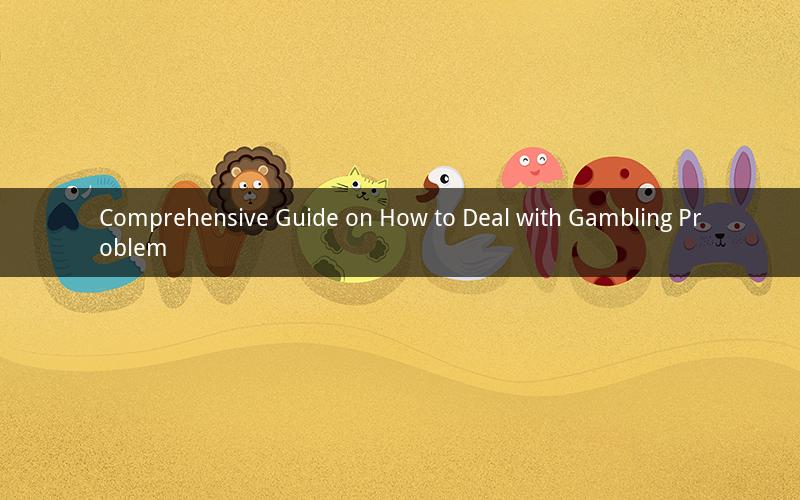
Gambling, once considered a mere form of entertainment, has now evolved into a significant issue affecting millions of people worldwide. It is crucial to understand the gravity of the situation and learn effective ways to deal with gambling problems. This article aims to provide a comprehensive guide on how to tackle this issue, offering insights and practical advice for those struggling with gambling addiction.
1. Recognize the Problem
The first step towards dealing with a gambling problem is to acknowledge its existence. Many individuals may not realize that their gambling habits have crossed the line into addiction. Here are some signs to help identify a gambling problem:
- Feeling restless or irritable when not gambling
- Needing to gamble with increasing amounts of money to achieve the desired excitement
- Repeated unsuccessful efforts to control, cut back, or stop gambling
- Gambling when you are feeling distressed, lonely, or sad
- Lying to family members, therapists, or others to conceal the extent of your gambling
2. Seek Professional Help
If you have recognized that you have a gambling problem, seeking professional help is crucial. Therapists, counselors, and psychologists specializing in addiction can provide personalized support and guidance. Here are some types of professional help you can consider:
- Cognitive-behavioral therapy (CBT): This therapy helps individuals identify and change negative thoughts and behaviors associated with gambling.
- Family therapy: Family therapy can help improve communication and rebuild trust within the family unit.
- Support groups: Joining a support group, such as Gamblers Anonymous, can provide a sense of community and support from others who are facing similar challenges.
3. Create a Support System
Building a strong support system is essential in dealing with a gambling problem. Surround yourself with individuals who are supportive and understanding. Here are some tips for creating a support system:
- Inform close friends and family members about your gambling problem and seek their support.
- Attend support group meetings regularly to connect with others who are struggling with similar issues.
- Consider joining a gambling recovery program, such as SMART Recovery, which offers peer support and guidance.
4. Develop Financial Strategies
Gambling addiction often leads to significant financial problems. To address this aspect, it is crucial to develop financial strategies that can help you regain control over your finances. Here are some tips:
- Create a budget: Track your income and expenses to understand your financial situation better.
- Set limits: Establish a spending limit for gambling and stick to it.
- Consider seeking financial counseling: A financial counselor can help you create a plan to manage your debt and improve your financial situation.
5. Learn Coping Skills
Learning coping skills is essential in dealing with the emotional and psychological aspects of gambling addiction. Here are some effective coping strategies:
- Practice relaxation techniques: Techniques such as deep breathing, meditation, and yoga can help reduce stress and anxiety.
- Find healthy hobbies: Engaging in activities that provide a sense of fulfillment and joy can help distract you from the urge to gamble.
- Exercise regularly: Physical activity can improve your mood and reduce the risk of relapse.
6. Avoid Triggers
Identifying and avoiding triggers is crucial in preventing relapse. Here are some tips for avoiding triggers:
- Stay away from casinos, racetracks, and other gambling venues.
- Limit your exposure to gambling-related content, such as advertisements and websites.
- Inform friends and family members about your triggers so they can help you avoid them.
7. Stay Committed to Recovery
Dealing with a gambling problem is a long-term process. It is essential to stay committed to your recovery journey. Here are some tips for maintaining your commitment:
- Celebrate small victories: Recognize and celebrate your progress, no matter how small.
- Stay connected with your support system: Regularly communicate with friends, family, and support group members.
- Be patient with yourself: Understand that recovery is a process, and setbacks are a natural part of the journey.
Questions and Answers:
1. Q: How can I tell if I have a gambling problem?
A: Look for signs such as feeling restless or irritable when not gambling, needing to gamble with increasing amounts of money, repeated unsuccessful efforts to control gambling, lying to hide your gambling habits, and gambling when feeling distressed or sad.
2. Q: Can I overcome a gambling problem on my own?
A: While it is possible to overcome a gambling problem on your own, seeking professional help and joining support groups can significantly improve your chances of recovery.
3. Q: Are there any medications available to treat gambling addiction?
A: Currently, there are no medications specifically designed to treat gambling addiction. However, medications may be prescribed to address co-occurring mental health issues, such as depression or anxiety.
4. Q: How long does it take to recover from a gambling problem?
A: The duration of recovery varies from person to person. Some individuals may experience immediate improvement, while others may need ongoing support and therapy for several years.
5. Q: Can I still enjoy gambling if I have a gambling problem?
A: It is essential to戒除赌博 if you have a gambling problem. Engaging in gambling activities can trigger relapse and worsen your addiction. Focus on developing healthy coping strategies and hobbies to fill the void left by gambling.